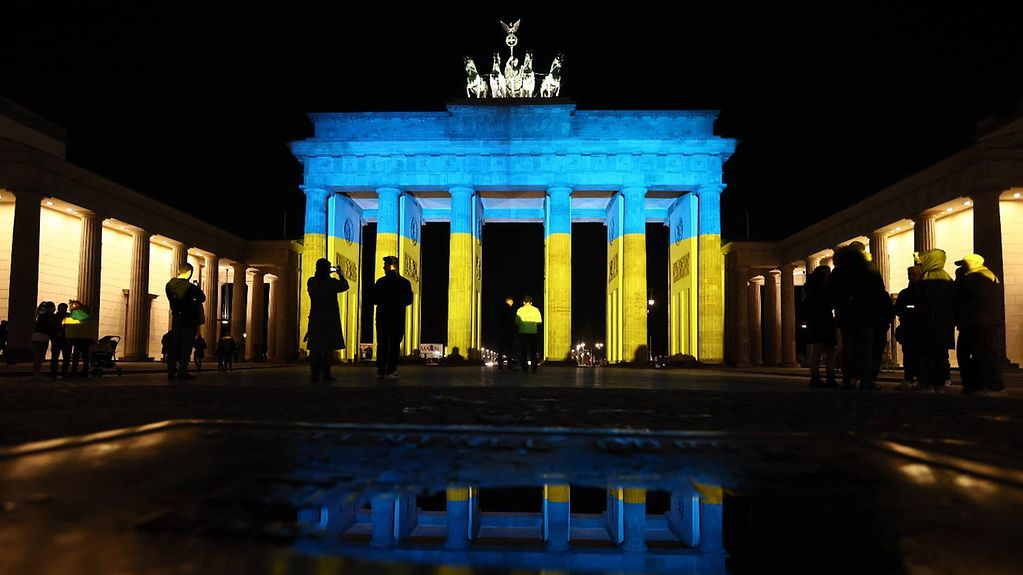Support for Ukraine
The EU interior ministers have agreed on swift, straightforward admission of war refugees from Ukraine. They will enjoy temporary protection that is initially valid for one year but can be extended for up to two more years. The decision was unanimous.
3 Min. Lesedauer

A sign of solidarity: the Brandenburg Gate is illuminated in the colours of Ukraine.
Foto: imago images/NurPhoto
In concrete terms, the decision taken by EU interior ministers means that refugees from Ukraine do not have to go through an asylum procedure. They will receive temporary protection in the European Union for a period of up to three years. They will be able to pursue employment, have health insurance and send their children to school. “There is a war in the middle of Europe. This requires us to offer all the solidarity and help we can,” said Federal Minister of the Interior Nancy Faeser. It was a “paradigm shift” that all EU states were ready to accept refugees, said Faeser. The minister expects the directive to go into force within a few days.
The Russian war of aggression against Ukraine has caused terrible suffering among the people there. The humanitarian situation in Ukraine is worsening by the hour. The United Nations Refugee Agency expects up to four million refugees, with up to eight million more forced to leave their homes as a result of the Russian attack and relying on emergency aid in the interior of Ukraine.
The Federal Government is prepared
The Federal Government promised to offer extensive aid to refugees from Ukraine shortly after the fighting began. “The Federal Government will offer all the support it can,” said Faeser. “We are prepared and carefully observing all the potential impacts of this war.” German aid activities are closely coordinated between the Federal and Länder Governments.
“We are stunned by what is being inflicted on Ukraine yet again, but we are not powerless. We will not leave you alone to suffer this reckless aggression against your country,” said Foreign Minister Annalena Baerbock. After the war began, Germany increased its contribution to the United Nations Ukraine Relief Fund by five million euros as an initial step to ensure medical supplies and safe accommodation can be provided quickly for Ukrainians. In addition, the Federal Government is making ten million euros available at short notice to the International Committee of the Red Cross, which is operating in Ukraine and neighbouring countries.
The United Nations Ukraine Fund can be accessed by international organisations such as the UN Refugee Agency and the World Food Programme as well as local organisations to provide rapid assistance on the ground.
Federal Agency for Technical Relief is in action
The Federal Agency for Technical Relief (THW) has already deployed forces to countries neighbouring Ukraine. In Romania, Moldova, Poland and Slovakia, the helpers are looking into possible relief measures and establishing contacts with national and international organisations. In the Republic of Moldova, for example, the embassy residence is to be prepared to accommodate aid workers. In Kraków, Poland, THW is supporting the logistics hub run by the World Food Programme.
In addition, THW is taking charge of coordinating relief supplies provided by the federal states of Ukraine. It also is taking steps to organise and prepare accommodation in Germany where refugees can be housed.
Great solidarity among the population
In many places in Germany, in Europe and around the world, citizens are taking to the streets to demonstrate peacefully against the unjustified war unleashed by Russian President Putin. This is also a reflection of how people view the situation: it is Putin’s war and they are in solidarity with Ukrainians.
Numerous aid organisations – including the United Nations High Commissioner for Refugees (UNHCR) as well as national and international organisations and alliances – are appealing for donations to help the Ukrainian population affected by war and displacement.
See here for further information on Humanitarian Aid from the EU and from Germany.
An overview of the